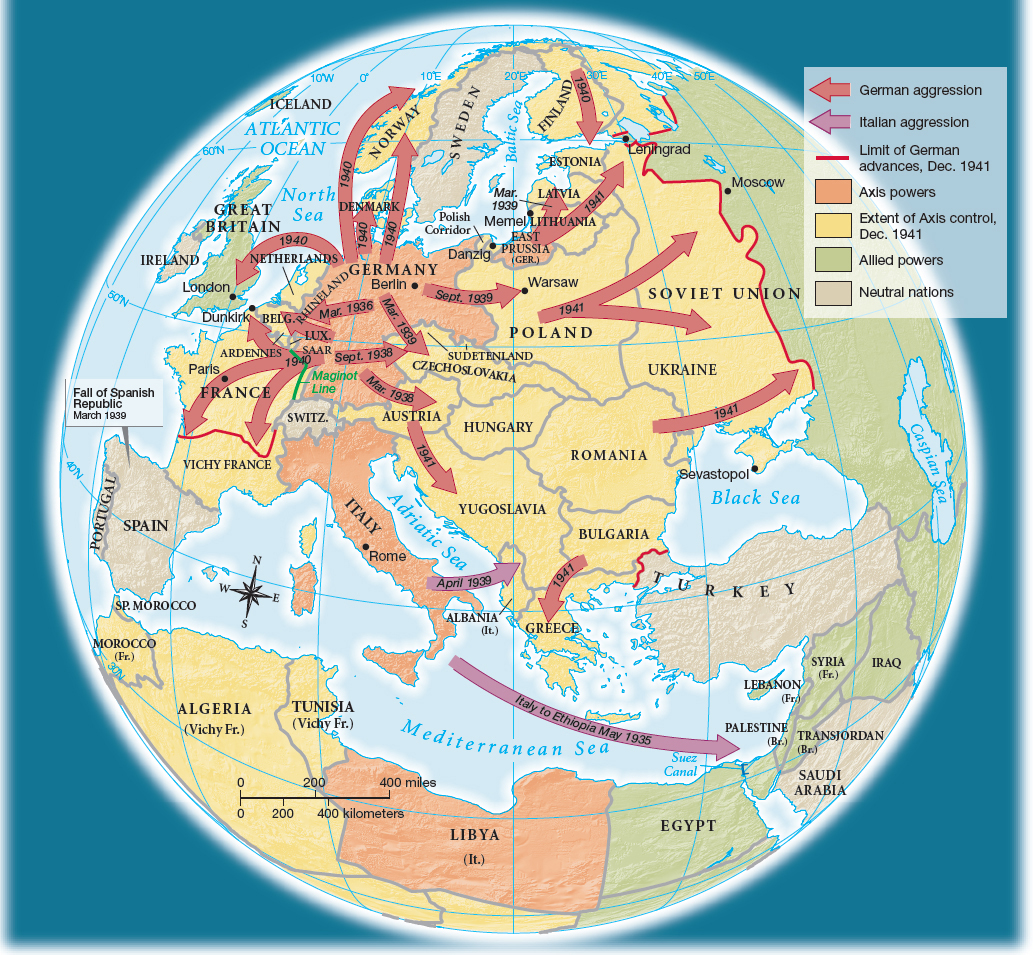Nazi Aggression and War in Europe
Printed Page 748
Under the spell of isolationism, Americans passively watched Hitler’s relentless campaign to dominate Europe (Map 25.1). In 1938, Hitler incorporated Austria into Germany and turned his attention to the Sudetenland, which had been granted to Czechoslovakia by the World War I peace settlement. Hoping to avoid war, British prime minister Neville Chamberlain offered Hitler terms of appeasement that would give the Sudetenland to Germany if Hitler agreed to leave the rest of Czechoslovakia alone. Hitler accepted the terms but didn’t keep his promise. By 1939, Hitler had annexed Czechoslovakia and demanded that Poland return the German territory it had gained after World War I. Recognizing that appeasement of Hitler had failed, Britain and France assured Poland that they would go to war with Germany if Hitler attacked. In turn, Hitler negotiated with Soviet premier Joseph Stalin, offering him concessions to prevent the Soviet Union from joining Britain and France in opposing a German attack on Poland. Despite the enduring hatred between fascist Germany and the Communist Soviet Union, the two powers signed the Nazi-Soviet treaty of nonaggression in August 1939, exposing Poland to an onslaught by both the German and Soviet armies.

 British strategy aimed at avoiding a war with Germany in the late 1930s by not objecting to Hitler’s policy of territorial expansion.
British strategy aimed at avoiding a war with Germany in the late 1930s by not objecting to Hitler’s policy of territorial expansion.
CHAPTER LOCATOR
How did the United States respond to international developments in the 1930s?
How did the outbreak of war affect U.S. foreign policy?
How did the United States mobilize for war?
How did the Allies turn the tide in Europe and the Pacific?
How did the war change life on the American home front?
How did the Allies finally win the war?
Conclusion: Why did the United States emerge as a superpower at the end of the war?
 LearningCurve
LearningCurve
Check what you know.
At dawn on September 1, 1939, Hitler unleashed his blitzkrieg (literally, “lightning war”) on Poland. “Act brutally!” Hitler exhorted his generals. “Send [every] man, woman, and child of Polish descent and language to their deaths, pitilessly and remorselessly.” The attack triggered Soviet attacks on eastern Poland and declarations of war from France and Britain two days later, igniting a conflagration that raced around the globe. In September 1939, Germany seemed invincible, causing many people to fear that all of Europe would soon share Poland’s fate.
After the Nazis overran Poland, Hitler soon launched a westward blitzkrieg. In the first six months of 1940, German forces smashed through Denmark, Norway, the Netherlands, Belgium, and France. The speed of the German attack trapped more than 300,000 British and French soldiers, who retreated to the port of Dunkirk, where an improvised armada of British vessels ferried them to safety across the English Channel. By mid-June 1940, France had surrendered the largest army in the world, signed an armistice that gave Germany control of nearly two-thirds of the countryside, and installed a collaborationist government at Vichy. With an empire that stretched across Europe from Poland to France, Hitler seemed poised to attack Britain.
The new British prime minister, Winston Churchill, vowed that Britain, unlike France, would never surrender to Hitler. “We shall fight on the seas and oceans [and] … in the air,” he proclaimed, “whatever the cost may be, we shall fight on the beaches, … and in the fields and in the streets.” Churchill’s defiance stiffened British resolve against Hitler’s attack, which began in mid-June 1940 when wave after wave of German bombers targeted British military installations and cities, killing tens of thousands of civilians. The outgunned Royal Air Force fought as doggedly as Churchill had predicted and finally won the Battle of Britain by November, clearing German bombers from British skies and handing Hitler his first defeat. Churchill praised the valiant British pilots, declaring that “never … was so much owed by so many to so few.” Battered and exhausted by German attacks, Britain needed American help to continue to fight, as Churchill repeatedly wrote to Roosevelt in private.